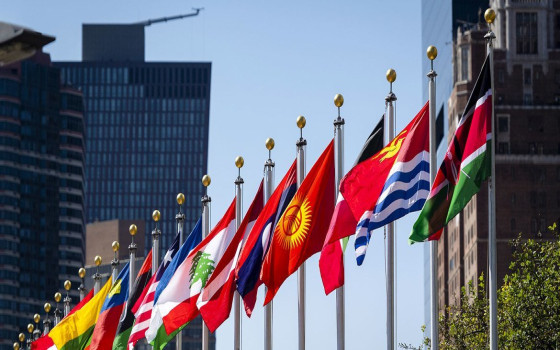
At the academic conference on Africa under the auspices of the United Nations.. There is a great need for cooperation between the academic community and decision-makers..

- Europe and Arabs
- Saturday , 7 December 2024 7:47 AM GMT
New York: Europe and the Arabs
"The successive crises over the past four years have proven that our African institution needs to improve its resilience," said the Assistant Minister of Foreign Affairs of Egypt, Ambassador Ashraf Sweilem, after participating in the Academic Conference on Africa 2024 organized by the United Nations. According to the daily UN news bulletin, a copy of which we received this morning,
UN News met with the Assistant Minister of Foreign Affairs of Egypt after a session held at the end of the conference that focused on how to bridge the gap between academics and policy makers, which was held between 3 and 5 December and organized by the Office of the United Nations Special Adviser on Africa, and was titled "Power, Justice and the People: Human Rights and the Rule of Law for Africa's Transformation."
The conference also focused during its three days on the development of the rule of law in Africa, and the integration of the various dimensions of human rights on the continent.
The Egyptian Assistant Foreign Minister said that there is a need to change the approach to dealing with problems when they arise in Africa, noting that this issue "requires an institutional reform process, and a review of the approach by decision-makers, not only in government institutions, but also in continental organizations."
Regarding how to bridge the gap between academics and decision-makers, he stressed that "the only way is for each group to understand how the other group deals with all issues, because the size of the problems is large and the size of the challenges is increasing."
Suwailem spoke about conflicts and their repercussions, noting that the problem with the approach used by the international community as a whole is resorting to a process of conflict management and trying to mitigate its impact on societies rather than solving it.
The conference, as I mentioned, first addressed the challenges and opportunities facing the African continent, the changing world in which we live, and the need to then bridge the gap or gap that exists between decision-makers in state institutions in general and between civil society, the private sector, and others.
However, the focus of this year's conference was on the academic community - thought and opinion leaders.
The conference addressed the reasons for the existence of this gap and how to deal with it. In my intervention, I tried to focus on the fact that both decision-makers and academics deal with the same set of problems, but their approach is different from the other, and that the challenge is not that there is no need for this cooperation, but that each category needs to deal with the other category according to its logic.
I gave examples of this, such as the academic, for example, often dealing with the idea that either the problem is completely solved, or there is no solution at all.
The decision-maker who deals with state institutions deals with many problems and constraints, whether on time, effort, or available resources, whether human or material, and therefore there is always a need to determine priorities and strive to accomplish what is most important and then the least important.
This, for example, is the difference in approach between decision-makers and academics, and that the only way is for each category of them to understand how the other category deals with all topics, because the truth is that the size of the problems is large and the size of the challenges is increasing.
We, as officials, whether in the Egyptian government or in regional or international organizations or other governments around the world, are in dire need of cooperation with the academic community.












No Comments Found